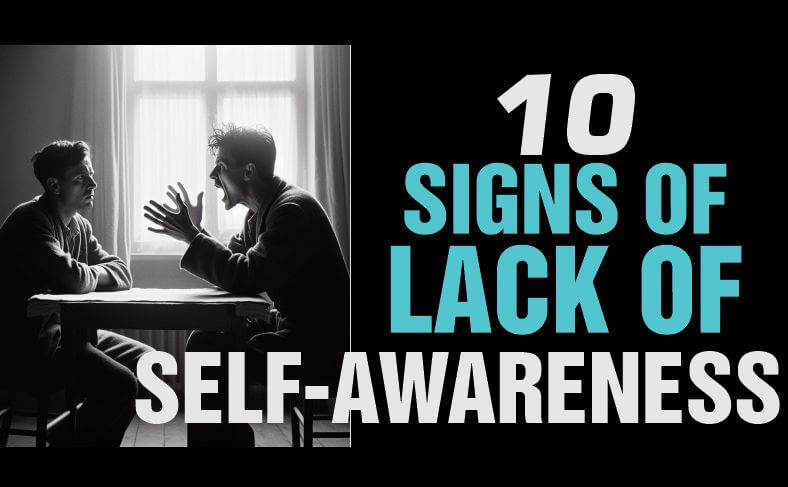Discover 10 signs you lack self-awareness and the crucial role of introspection in personal growth and emotional intelligence.
Self-understanding is a fundamental aspect of personal growth and development.
It refers to the ability to recognize and understand one’s thoughts, emotions, strengths, weaknesses, and actions.
However, many individuals struggle with self-awareness, often without even realizing it.
In this article, we will explore ten signs that indicate a lack of self-awareness, shedding light on the importance of introspection and providing potential solutions for cultivating this vital skill.
10 Signs You Lack Self-awareness

1. Difficulty Accepting Feedback
One of the primary signs that you lack self-awareness is difficulty accepting feedback.
If you find yourself defensive, dismissive, or resistant to receiving constructive criticism, it may be a clear indication that you struggle to see your actions or behaviours objectively.
Self-aware individuals, on the other hand, embrace feedback as an opportunity for growth, recognizing that outside perspectives can provide valuable insights.
Tips: Reflect on feedback openly, practice active listening and empathy, and recognize feedback as a chance to improve, not a personal attack.
2. Lack of Emotional Regulation
Another sign of lacking self-awareness is an inability to regulate emotions effectively.
If you frequently find yourself overwhelmed, reacting impulsively, or struggling to control anger or sadness, it suggests an unawareness of your emotional triggers and an absence of introspection.
Tips: To improve self-awareness, acknowledge emotions without judgment, identify triggers, and consider therapy or mindfulness techniques for understanding and regulating emotions, fostering introspection and emotional intelligence.
3. Difficulty Making Decisions
Indecisiveness can be a result of a lack of self-awareness.
If you often struggle to make choices, fear making mistakes, or chronically seek validation from others, it may indicate a lack of clarity regarding your values, needs, and desires.
Tips: Regular self-reflection, journaling, meditation, and seeking support can help clarify values and priorities, empowering confident decision-making aligned with authentic self.
Related: How to Develop Cultural Self-awareness
4. Inconsistent Behaviour or Values
Inconsistency between your words and actions or a lack of coherence in presenting your values suggests a lack of self-awareness.
This sign shows a disconnection between who you think you are and how you genuinely behave.
Tips: Dedicate time to self-reflection, identify inconsistencies between actions and values, and work on aligning behaviors with authentic self. Regularly check thoughts, emotions, and actions for harmony and integrity.
Related Posts
Understanding Cultural Awareness
5. Limited Understanding of Personal Strengths and Weaknesses
A lack of self-awareness often leads to an insufficient understanding of personal strengths and weaknesses.
If you struggle to identify your areas of expertise or continuously overlook your limitations, it may hinder personal and professional growth.
Tips: Cultivate self-awareness through personality assessments, feedback collection, and personal reflection. Embrace a growth mindset to welcome self-improvement opportunities and uncover areas for growth.
6. Difficulty Establishing Authentic Relationships
A lack of self-awareness often manifests in the struggle to establish authentic and meaningful relationships.
If you find yourself consistently experiencing conflicts, miscommunication, or a sense of social isolation, self-reflection may be key.
By understanding yourself better, you can navigate relationships more effectively.
Tips: Reflect on communication style, emotional availability, and empathy. Seek feedback from close ones. Honest introspection reveals patterns hindering relationships, empowering growth for healthier connections.
Related: Importance of Self-awareness in Leadership
7. Continual Comparison with Others
Constantly comparing yourself to others indicates a lack of self-awareness and acceptance of your uniqueness.
When you measure your worth solely based on external achievements or qualities, it becomes challenging to recognize your strengths and individuality.
Tips: Combat comparison with self-reflection, self-compassion, gratitude, and appreciation for your unique journey. Celebrate achievements and find motivation in self-improvement.
8. Repetitive Negative Self-talk or Self-sabotage
Repetitive negative self-talk or self-sabotaging behaviour can be an indication of a lack of self-awareness.
If you continuously engage in negative self-talk or deliberately sabotage your efforts, it shows that you might not be fully aware of your strengths, capabilities, and potential.
Tips: To address this include mindfulness to recognize negative thoughts, reframing them positively, seeking feedback, and practicing self-compassion.
Related: Tips on How to Master Your Emotions
9. Lack of Empathy
Lack of empathy is a sign of lacking self-awareness as it indicates a limited understanding of your emotions and an inability to recognize and relate to the feelings of others.
This disconnect from both internal and external emotional experiences reflects a deficiency in recognizing and understanding your own emotional landscape.
Tips: Practice active listening, seek to understand the perspectives of others, engage in diverse experiences, and regularly reflect on and validate the emotions of others.
10. Not Accepting Responsibility
Not accepting responsibility is a sign of lacking self-awareness as it demonstrates an inability to recognize your role in situations.
This behaviour often involves blaming external factors or other people for personal shortcomings, reflecting a lack of introspection and understanding of your impact on outcomes and relationships.
Tips: Practice self-reflection, acknowledge personal contributions to situations and consider how your actions and choices influence outcomes and relationships.
Also Read: Interpreting Non-verbal Communication through Emotional Awareness
Importance of Introspection in Combating Lack of Self-awareness
Introspection is crucial for self-awareness as it allows you to:
1. Understand Emotions: Introspection helps in recognizing and understanding one’s emotions, leading to better emotional regulation and management.
2. Identify Strengths and Weaknesses: It enables individuals to identify their strengths and weaknesses, fostering personal and professional growth.
3. Clarify Values and Beliefs: Introspection aids in clarifying personal values and beliefs, guiding decision-making and behavior alignment.
4. Improve Relationships: By understanding one’s thoughts and emotions, individuals can improve their communication and empathy, leading to healthier relationships.
5. Enhance Self-Development: Introspection facilitates self-improvement by identifying areas for growth and fostering a growth mindset.
6. Decision-making: It helps in making more informed decisions by aligning choices with personal values and goals.
Frequently Asked Questions
What are signs of lacking self-awareness?
Signs include defensiveness, lack of empathy, and resistance to feedback, hindering personal growth and healthy relationships.
How does introspection enhance self-awareness?
Introspection fosters understanding of emotions, identification of strengths and weaknesses, and alignment with personal values, promoting growth and authenticity.
Why is self-awareness important?
Self-awareness improves emotional intelligence, decision-making, and relationships, leading to personal growth, fulfillment, and effective communication.
How can one cultivate self-awareness?
Cultivate self-awareness through introspection, seeking feedback, mindfulness practices, and embracing a growth mindset for continuous self-improvement and authenticity.
Final Word from The Conducts of Life
Recognizing these 10 signs you lack self-awareness is the first step toward personal growth and improved relationships.
From defensiveness and lack of empathy to an inability to accept responsibility, these signs can hinder your emotional intelligence and overall well-being.
By acknowledging these signs and embracing introspection, you can understand yourself properly leading to greater authenticity, and emotional resilience.
References:
- https://www.trackinghappiness.com/signs-lack-self-awareness/
- https://www.happierhuman.com/lack-self-awareness/
- https://www.calmsage.com/signs-you-lack-self-awareness/
- https://kolleqtive.com/blog/10-signs-you-lack-self-awareness/
Pious Clements is the insightful voice behind "The Conducts of Life" blog, where he writes about life ethics, self-development, life mastery, and the dynamics of people and society.
With a profound understanding of human behaviuor and societal dynamics, Pious offers thought-provoking perspectives on ethical living and personal growth.
Through engaging narratives and astute observations, he inspires readers to navigate life's complexities with wisdom and integrity, encouraging a deeper understanding of the human experience and our place within society.
